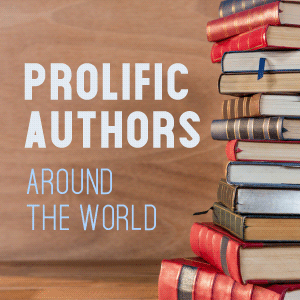Happy Birthday, Ernest Gaines
“I have no more to say, except this: We must live with our own conscience. Each and every one of us must live with his own conscience.”
-Ernest J. Gaines, A Lesson Before Dying

Today, celebrated American author Ernest Gaines turns 83. To celebrate, let’s take a look at Gaines’ life, his writing, and his many achievements and awards.
Life of Ernest Gaines
The oldest of 12 children, Ernest James Gaines was born on January 15, 1933, on a sugar plantation in rural Pointe Coupee Parish, Louisiana. Gaines was raised primarily by his great-aunt Augusteen Jefferson on the same land where his ancestors were once held as slaves.
From the age of 9, Gaines worked in the fields with his family, only attending school for half the year in a one-room schoolhouse at the local black church. As the city had no public high school for black children, Gaines attended a segregated high school in New Roads, Louisiana, for three years. At the age of 15, Gaines moved to Vallejo, California, to join his mother and stepfather who had moved there in search of work. Gaines wrote his first novel when he just was 17 years old, but he burned the manuscript when a publisher rejected it.
Gaines graduated from Vallejo Junior College and spent two years in the U.S. Army. He then attended San Francisco State University, where he earned a degree in literature and published his first short story in the university’s literary magazine, Transfer. He spent two years in the U.S. Army, after which he won a prestigious writing fellowship at Stanford University. His first novel, actually taken from his earlier burned manuscript, was published in 1964 as Catherine Carmier. In 1966, Gaines won a grant from the National Endowment for the Arts, and a year later, his second novel, Of Love and Dust, was published. Within the next few years, Gaines earned a writer-in-residence at Denison University.
Wide acclaim reached Gaines in 1971, when he published The Autobiography of Miss Jane Pittman, a novel that follows the struggles of the African Americans after emancipation. A sweeping work with many historical references, the novel spans from the Civil War to the Vietnam War. Three years after its publication, the novel was adapted for TV film, and the adaptation won nine Emmy awards.
Shortly thereafter, Gaines won a Guggenheim Foundation Fellowship and published several more works, including In My Father’s House and A Gathering of Old Men. In 1993, he published his most critically acclaimed work, A Lesson Before Dying. Several of these works have also been adapted for film.
Ernest Gaines has won several other awards throughout his lifetime, including a MacArthur Genius Grant, the National Humanities Medal of the United States, the National Medal of the Arts, the Sidney Lanier Prize for Southern Literature, and an appointment as a Chevalier of France’s Order of Arts and Letters. He has served as Writer-in-Residence at the University of Louisiana, Lafayette, for over 30 years, and he and his wife split their time between San Francisco and Louisiana.
A Lesson Before Dying
Next to The Autobiography of Jane Pittman, Gaines’ most critically acclaimed work is 1993’s A Lesson Before Dying. Like most of Gaines’ work, A Lesson Before Dying takes place in the fictional rural town of Bayonne, a mirror of Gaines’ actual hometown. (Actually, nearly all of Gaines’ novels take place in the fictional town of Bayonne, which is often compared to William Faulkner’s fictional setting of Yoknapatawpha County.)
A Lesson Before Dying follows Jefferson, a young uneducated black man who found himself in the wrong place at the wrong time and ended up accused of murdering a white storeowner. Despite his attorney’s defense that Jefferson is a “hog” too dumb to plan a robbery and murder, Jefferson is convicted of the crime and sentenced to death by electrocution. At the behest of Jefferson’s godmother who at least wants to see her godson die as a man, a local black teacher named Grant Wiggins begins to meet with Jefferson, forming a friendship and mentorship that changes both men.
Called a “moving and truthful work of fiction” by the New York Times Book Review, A Lesson Before Dying won the National Book Critics Circle Award in 1994.
Ernest Gaines’ Impact
Drawing inspiration from both traditional African American oral storytelling and the great Russian authors like Tolstoy and Chekov, Ernest Gaines created an entirely new literary space and gave voice to previously silenced people. Gaines is celebrated for his depiction of the American South and the ways in which society constrains, hides or devalues black heritage. His works often feature strong female characters, thought to be based on his Great-Aunt Augusteen, as well as black men searching for identity and dignity in an alienating environment.
Gaines’ novels provide important historical and cultural perspectives on racism, marginalization, male identity and gender. His work has been translated into languages around the world and are staples of American high school and university curriculum.
In addition to his many literary awards and novels, Gaines remains a highly sought-after essayist and teacher. He teaches a creative writing course every year at the University of Louisiana, Lafayette, where he remains a writer-in-residency. In 2007, the Baton Rouge Area Foundation and its donors established the Ernest J. Gaines Award for Literary Excellence, given annually to support emerging black writers.
Read more about Ernest Gaines in his own words in these interviews with the Academy of Achievement, PBS and the Missouri Review.





Leave a Reply
Be the First to Comment!